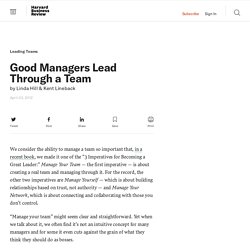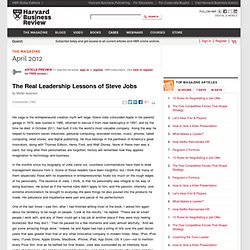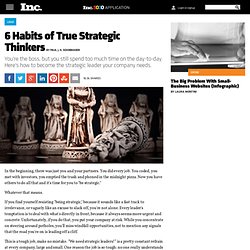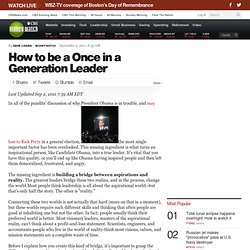

The Folly of Stretch Goals - Daniel Markovitz. By Daniel Markovitz | 1:39 PM April 20, 2012 Let’s dispense, once and for all, with the managerial absurdity known as “stretch goals.”

While it’s true that renowned psychologists Edwin Locke and Gary Latham described goal setting as “the most effective managerial tool available,” it’s also true that no less a thinker than W.E. Deming insisted that companies, “Eliminate management by objective.” In my opinion, there can be no such debate over the lack of usefulness of stretch goals. Here’s why. Stretch goals can be terribly demotivating. Good Managers Lead Through a Team - Linda Hill & Kent Lineback. We consider the ability to manage a team so important that, in a recent book, we made it one of the “3 Imperatives for Becoming a Great Leader:” Manage Your Team — the first imperative — is about creating a real team and managing through it.

For the record, the other two imperatives are Manage Yourself — which is about building relationships based on trust, not authority — and Manage Your Network, which is about connecting and collaborating with those you don’t control. “Manage your team” might seem clear and straightforward. It's Not What You Sell, It's What You Believe - Bill Taylor. By Bill Taylor | 9:14 AM April 4, 2012 Adam Lashinsky’s new book Inside Apple offers lots of intriguing material about Steve Jobs and the strategic choices, design principles, and business tactics that created the most valuable company on earth.

But for all of Lashinsky’s behind-the-scenes material about Apple’s legendary leader, it was a public story about Apple’s new leader, CEO Tim Cook, that captured my attention — and offered a powerful insight for leaders everywhere looking to create value in their organizations. The story goes back to January 21, 2009, during Cook’s inaugural conference call with investors after Jobs announced his medical leave of absence. The very first question, Lashinsky reports, was from an analyst who wanted to know whether Cook might replace Jobs permanently and how the company would be different if he did.
Cook did not respond with a detailed review of the products Apple made or the retail environments in which it sold them. The Real Leadership Lessons of Steve Jobs. His saga is the entrepreneurial creation myth writ large: Steve Jobs cofounded Apple in his parents’ garage in 1976, was ousted in 1985, returned to rescue it from near bankruptcy in 1997, and by the time he died, in October 2011, had built it into the world’s most valuable company.

Along the way he helped to transform seven industries: personal computing, animated movies, music, phones, tablet computing, retail stores, and digital publishing. 6 Habits of True Strategic Thinkers. In the beginning, there was just you and your partners.

You did every job. You coded, you met with investors, you emptied the trash and phoned in the midnight pizza. Now you have others to do all that and it's time for you to "be strategic. " Whatever that means. If you find yourself resisting "being strategic," because it sounds like a fast track to irrelevance, or vaguely like an excuse to slack off, you're not alone. The Biggest Mistake a Leader Can Make - Video. Make a promise and deliver. Last Updated Sep 16, 2011 10:34 AM EDT Breakfast with orange juice.

Every day of your life. Sweet, tangy orange juice. Perfection in a glass. It works. Bridge the gap: aspirations and reality. Last Updated Sep 2, 2011 7:59 AM EDT In all of the pundits' discussion of why President Obama is in trouble, and may lose to Rick Perry in a general election, the most single important factor has been overlooked.

Sweat the small stuff. Know what really motivates people. Skip the Bonus: Give Them a Real Project. Science has managed to reveal some crazy things that fly in the face of almost every commonly accepted management practice.

Here's the latest: Rewards for top performers lead them to worse performance. And if you want to foster innovation, bonuses won't work either. Rather, it's all about letting people slip from under line management and strike out on their own, on projects they care about. Dan Pink lays all that out in this new video, which illustrates a talk he gave at the RSA (a kind of British version of TED): Wild stuff, and all the more unsettling because of the current mess on Wall Street. The fact that science has also created a new vision for workplace performance--fueled less by management and more by individual goals--is shocking. Ask the right questions. By Polly LaBarre | 2:27 PM November 10, 2011 Some fifteen years ago, in the early days of starting up Fast Company magazine, co-founder Alan Webber shared one of his rules of thumb with me: “A good question beats a good answer.”

That pithy wisdom sunk in and took hold immediately. The first thing you notice when you have your ears pricked for questions is that most people (especially businesspeople) are more interested in presenting solutions, making assertions, and sharing their vision. This isn’t surprising. School programs us to focus on producing the right answer, and the job description of a leader for the last century has basically been “the person with all the answers.”
That’s why it’s so refreshing (and instructive) to spend time with people who lead with questions rather than answers. 1.